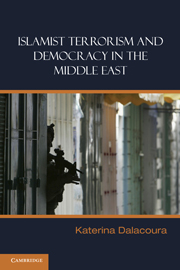Book contents
- Frontmatter
- Contents
- Acknowledgements
- Introduction: The Book's Central Question and Rationale
- 1 Terrorism, Democracy and Islamist Terrorism
- 2 Transnational Islamist Terrorism: Al Qaeda
- 3 Islamist Terrorism and National Liberation: Hamas and Hizbullah
- 4 Islamist Terrorism in Domestic Conflicts: The Armed Islamic Group in Algeria and the Gamaa Islamiya in Egypt
- 5 Moderation and Islamist Movements in Opposition: The Jordanian Muslim Brotherhood/Islamic Action Front, the Egyptian Muslim Brotherhood and the Tunisian Nahda
- 6 Islamist Moderation and the Experience of Government: Turkey's Welfare and Justice and Development Parties and the Islamic Republic of Iran
- Conclusion
- Bibliography
- Index
1 - Terrorism, Democracy and Islamist Terrorism
Published online by Cambridge University Press: 05 June 2012
- Frontmatter
- Contents
- Acknowledgements
- Introduction: The Book's Central Question and Rationale
- 1 Terrorism, Democracy and Islamist Terrorism
- 2 Transnational Islamist Terrorism: Al Qaeda
- 3 Islamist Terrorism and National Liberation: Hamas and Hizbullah
- 4 Islamist Terrorism in Domestic Conflicts: The Armed Islamic Group in Algeria and the Gamaa Islamiya in Egypt
- 5 Moderation and Islamist Movements in Opposition: The Jordanian Muslim Brotherhood/Islamic Action Front, the Egyptian Muslim Brotherhood and the Tunisian Nahda
- 6 Islamist Moderation and the Experience of Government: Turkey's Welfare and Justice and Development Parties and the Islamic Republic of Iran
- Conclusion
- Bibliography
- Index
Summary
Islamist terrorism has dominated the field of terrorism studies since the attacks of 11 September 2001. Its proper analysis, however, is bedevilled by Middle Eastern and Islamic ‘exceptionalism’, which either implicitly or explicitly assumes an inherent association between terrorism and the Middle East as a region and/or Islam as a religion. Such exceptionalism removes Islamist terrorism from the wider context of terrorism studies and places it in a separate and unique category. Recent developments in the field, such as the focus on ‘new terrorism’ – which has become increasingly linked with Islamism since 2001 – have reinforced the idea of a close association between Islam and terrorism. The present chapter bucks this trend. It situates Islamist terrorism within the wider global and historical context of terrorism studies and suggests that we must use social-scientific conceptual tools to analyse it. De-mystifying Islamist terrorism in this way constructs a foundation for understanding the causes of its emergence and development in the Middle East region – the task of subsequent chapters.
One instance of the combined effects of Middle Eastern and Islamic ‘exceptionalisms’ is the automatic or facile association between the Middle East and Islamist terrorism. Islamist terrorism may be most visible at present, but for the greater part of the post–World War II period, the Middle East was, and in some cases remains, more closely associated with terrorism of the ethno-nationalist and left-wing ideological types.
- Type
- Chapter
- Information
- Islamist Terrorism and Democracy in the Middle East , pp. 21 - 39Publisher: Cambridge University PressPrint publication year: 2011
- 1
- Cited by

